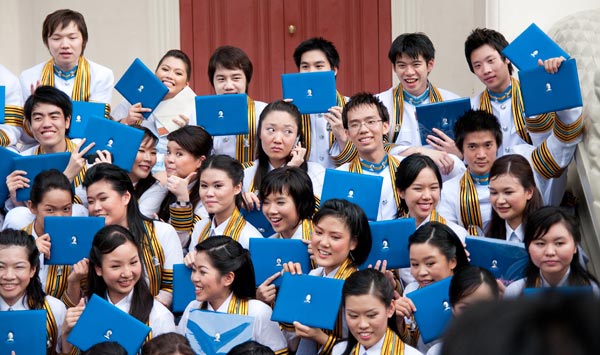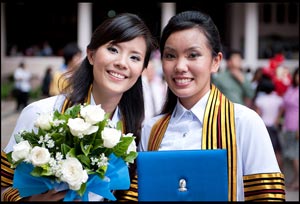
Business degrees are a big industry in the Kingdom, but not every degree means business.
“Years ago, the MBA was a good idea…” Zak Buttell, a Chulalongkorn graduate and former Wall Street financial consultant, tells me over Thai iced coffee at a highly affluent street front café a block or two off Bangkok’s Victory Monument.
Like iced coffee, Zak says, the Masters degree in Business Administration is a concept floated to Thailand from foreign shores, one which has become a popular choice for business students anxious to join the Kingdom’s elite. But what is an MBA for? And is the high-level job market experiencing an oversaturation of new MBAs?
“The opportunities still exist, but there are just too many pursuing them now,” Zak says.
Adding to the burden, is cost. Degrees aren’t cheap. It reminds me of a phenomenon I have often wondered at in Thailand. Consider the coffee shop Zak and I are at: it offers the same product at the same price as another shop two or three doors down. Pharmacies, cell phone shops, T-shirt stands seem to repeat over and over, decreasing the share for everyone. Is the significant investment in an MBA worthwhile? “You need to go to Abac, they’re like the MBA factory,” Zak tells me, finishing his $2 dishwater mocha.
I find Abac, which stands for Assumption Business Administration College, tucked neatly behind the sprawling, city park-like grounds of Ramkamhaeng University. From the entrance, which resembles a micro version of the Arc de Triomphe in Paris and proclaims “You are the salt of the earth,” I can hear shotgun blasts from the Ram sport shooting club. The campus is compact and organised, and I manage to catch Jean Dautrey, one of the universities’ foreign professors, for a short conversation on his way to meet the dean.
Dautrey says that Abac has pioneered the idea of international schools in Thailand, and that it is one of the best schools in the country. “Abac is top of the 2nd tier. The top school is Sasin, but it is theoretical, and this school is more practical.” He says that because the ultimate dream of many of his students is to own a business, Abac has an “emphasis on creativity. They told me when I started work here, ‘No rote learning’.”
The success of Abac, Dautrey feels, has led to imitation. “There is definitely an inflation of schools. This programme is successful, and they [other schools] want to capitalise on that . . . it’s a money-making scheme.” The edge that Abac offers, he says, is that it understands the need to integrate English skills with business skills, and the university is fully accredited internationally.
“Worldwide, there is an inflation of MBA degrees. I graduated law school in the US and it’s the same game. In legal circles, everyone asks where you went to school,” Dautrey says as he walks toward the dean’s office, and adds, “Our students do get jobs relatively easily.”
There is a huge variety of MBA degrees available, but to be accepted into the school, a prospective student needs some work experience. At many overseas schools, a minimum of five years is required working in a field related to that which the student wants to attain an MBA. At Abac, the minimum requirement is two years, which may be a sign that competition among schools is strong. Along Ramkamhaeng Road, a row of banners hang with slogans like “MBAs for CEOs,” or perhaps more to the point, and echoing Dautrey’s admission that prestige rides a name, “Know how, know who”.
 So, what do new MBA graduates do next? Do they look for work with a former employer? Do they continue studying while working, or do they take a risk and enter the world of entrepreneurship immediately? Glen Chatelier, the director of the office of international affairs at Abac, says the university’s MBA graduates are high in demand. “Recently Siam Cements trading, the distribution wing of Siam Cements Group hired a Polish graduate from Assumption University’s MBA programme, after they were satisfied with her internship. Ms Bogna has now gone on to open SCT’s first ever European Office in Warsaw, and of course she is SCG’s first ever European employee.”
So, what do new MBA graduates do next? Do they look for work with a former employer? Do they continue studying while working, or do they take a risk and enter the world of entrepreneurship immediately? Glen Chatelier, the director of the office of international affairs at Abac, says the university’s MBA graduates are high in demand. “Recently Siam Cements trading, the distribution wing of Siam Cements Group hired a Polish graduate from Assumption University’s MBA programme, after they were satisfied with her internship. Ms Bogna has now gone on to open SCT’s first ever European Office in Warsaw, and of course she is SCG’s first ever European employee.”
That is big news for Abac; a graduate going on to win great success in Europe, but what about Thai graduates who want to work in Thailand? Chatelier admits there is an oversaturation of MBA programmes in Thailand, “however, there is a trend for the MSc (Master of Science) specific field specialisations, and these may take over the run of the mill MBAs.”
Chatelier, like Dautrey, recommends that I look up the work of John Barnes, PhD, who has published his own findings on the “International” MBA, meaning, one taught in English, in the only known analysis of Thai programmes.
“There are many criticisms of the generic MBA degree,” Barnes begins, “One being that administration can be taught in schools and universities, whilst management must be learned through experience in the workplace.” Barnes formally contacted over 100 companies in Bangkok who have hired MBA graduates to ask them about the performance of graduates trained in Thailand. He found a “pool of surplus graduates of some of the less prestigious programmes” that had difficulty finding jobs.
The study also found that the quality of graduates of top-tier schools may in fact not be high enough, yet employers often offer them the highest salaries with sign-on and retention bonuses. Additionally, as Barnes wrote, “Students who go abroad to obtain MBA degrees at top business schools in Britain, the United States or Australia, and return to take up employment in Bangkok will influence the MBA ‘salary cap’.
The reason for the disparity of overseas and top-tier schools versus all the rest of the “generic MBA” degrees? As Barnes found, it was a question of “interpersonal communication” or English-language skills. Additionally, many employers in Thailand supplement whatever MBA training an employee has had with in-house training. Due to recent economic problems, many have been forced to cut costs, including training centres, which has amplified the need for fully competent MBA graduates. Finally, Barnes has found that as MBA graduates gain power and influence they may prejudicially hire people from their own schools.
As Dautrey notes, problems also run deep in the educational system. “After 20 years of being told to sit down and shut up, it’s difficult for students to engage,” he observes of the tendency toward corruption and apathy. “The government has acknowledged that education needs to be improved. They want this to be a hub of learning.”
The other important point that Barnes takes up is the ethical role MBAs play in society. Quoting one of the sources in his study, he notes, “‘Most of the MBA programmes that I see today don’t help students link with the reality of going home and actually seeing a slum on their way.
“How do you get the MBA programme to link with those social issues in our community?” he asks, adding, “I also think the MBA programme curriculum needs to include issues such as government transparency, cultural sensitivity and social responsibility issues. In Singapore they don’t bribe people. They used to bribe people, but the Singaporeans didn’t like it and they changed. In Thailand people don’t like it but it happens . . . it seems as though people here don’t want it sufficiently enough for it to be changed. You need to help people in [Thailand] understand why it is still going on.”
This is a point which seems especially prescient given the recent protests in Bangkok. Thailand, with one of the highest economic disparities in the world, has seen the poorest trying to economically blockade Bangkok, the commercial capital, in order to affect a change in the government.
For those considering pursuing an MBA in Thailand, all these factors and more need to be considered. MBA graduates have the potential to transcend class systems and climb corporate power structures by virtue of their skills in the workplace, but the success of an MBA also seems to be governed by that old commercial maxim: You get what you pay for.
Please mind the gap
Business degrees are a big industry in the Kingdom, but not every degree means business. “Years ago, the MBA was a good idea…” Zak Buttell, a Chulalongkorn graduate and former Wall Street financial consultant, tells me over Thai iced coffee at a…

